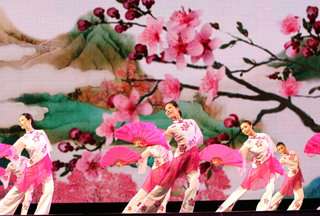|
Back
Deities, Dragons, Dancers, and Divas Washington
Kennedy Center Opera House
01/19/2010 - & January 20*, 21, 22, 23, 24
Jing Xian: The Emperor Ushers in a Glorious Age, Lanterns, Splitting the Mountains, The Buddha’s Teachings Spread Far and Wide
Hong Ming: Hesitate No Longer, Calmly take a Look
Junyi Tan: Flowing Silk, In a Miao Village, Mongolian Hospitality, Nothing Can Block the Divine Path, Tibetan Dance of Praise, Fairies of the Clouds, Elegant Embroidery, Handkerchiefs
Cheng En: Wu Song Battles the Tiger, Imperial Archers, Drummers of the Northwest
Zhiping Chen: A Message to the World
Xiaochun Qi: Dance of the Dai, Saving the Predestined
Yuan Gao and Junyi Tan: Astounding Conviction
The Shen Yun Corps de Ballet, Michelle Ren (Principal Female Dancer and Choreographer), Yungchia Chen* and Timothy Wu (Principal Male Dancers and Choreographer*), Golden Li, Rocky Liao, Tony Xuc, Vorathol Sac-Li (Featured Male Lead Dancers), Chelsea Cai, Madeline Lobjois, Angelia Wang, Alison Chen, Lily Wang, Nancy Wang (Featured Female Lead Dancers), Vina Lee and Xuejun Wang (Choreographers)
Pi-ju Huang (Soprano), Qu Yue (Baritone), Hong Ming (Tenor), Xiaochun Qi (Erhu Soloist), Peijong Hsich (Pianist/Accompanist)
The Shen Yun East/West Orchestra, Jung-Eun Kwon (Concertmistress), Ying Chen (Conductor),
Kelly Wen and Jared Madsen (Masters of Ceremonies)

Female Dancers (© Shen Yun Performing Arts)
A most unusual and noteworthy company is currently appearing onstage at the Kennedy Center Opera House. It is the “Shen Yun Performing Arts”, and with four separate companies now touring the United States, it is giving the American public a rare glimpse of traditional Chinese vocal music and dance. The production, which aims to capture the spirit and essence of pre-modern Chinese classical culture, draws its inspiration from millennia of heritage and traditions and the universal ideals that shaped them, such as goodness, beauty, harmony, and self-improvement.
The performance consists of twenty-two vignettes that are distinguished by dazzlingly colorful costumes, bravura dancing, and thrilling operatic singing. The individual numbers are enhanced by state of the art digital stage projections, which keep the set constantly changing from fields of cherry blossoms and mountain lakes to ethereal realms of divinities or to tiger inhabited forests. The cumulative effect is breathtaking to say the very least. The exceptionally fine orchestra, composed of western instruments (strings, brass, woodwinds, etc.) and traditional Chinese instruments (wood blocks, gongs, pipa, and the erhu) is soundly conducted by Maestra Ying Chen.
The female dance numbers are notable for their elegance and delicacy, especially in ballets such as “Fairies in the Clouds,” that incorporate white feathery fans and is danced upon a cloud covered floor, or “Mongolian Hospitality” which featured gorgeous orange and gold costumes, and employed ordinary dinner plates made extraordinarily musical with the aid of ornamented rings. The male ensemble dances are distinguished by their athleticism and acrobatics. Astounding leaps, flips, whirls, and twirls elicited cheering and applause from the audience. “The Drummers of the Northwest” is especially stirring. Set against the golden glow of China’s Loess Plateau the men pound upon waist drums with pulsating energy and vigorous rhythms while executing vibrantly amazing leaps. It is indeed breathtaking!
The three-featured vocal soloists are of an international operatic caliber. Soprano Pi-ju Huang displayed a dramatic voice with a beautifully rounded and lush quality. Bass-baritone Qu Yue has very dark voice with a most unusual timbre. His singing drew a hush over the audience. Tenor Hong Ming’s singing drew the loudest ovations of the entire evening. His voice might best be described as a “Chinese Pavarotti.” His perfectly placed high notes and thrilling High C were definitely a high point of the evening. He obliged the cheering audience with an immediate encore.
My favorite moment of the evening, however, was the original composition played upon the Chinese instrument known as the Erhu by virtuoso Xiaochun Qi. The instrument is somewhat of two-stringed ancient Chinese violin. The sonic quality of this instrument is haunting as is Ms. Qi’s meltingly lyric composition. It was an unforgettable performance, and as they say…”the melody lingers on.”
“Shen Yun” produces a new show every year and has toured around the world four times.
The present Washington Company will appear next in Fort Lauderdale, Florida. The inspiration for these productions comes from the philosophy of the Falun Dafa. This is a Chinese practice of self-cultivation, which, among many teachings, promotes the brotherhood of humanity and the peaceful co-existence of all societies. Should the production be touring in your area of the world I heartily recommend attending a performance. You will find it inspiring and uplifting, and above all else…most entertaining!
Micaele Sparacino
|